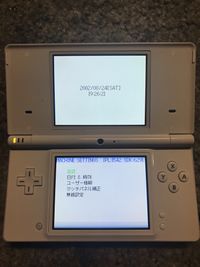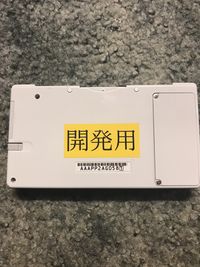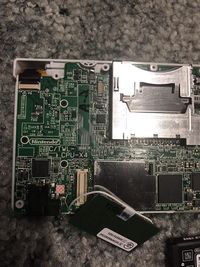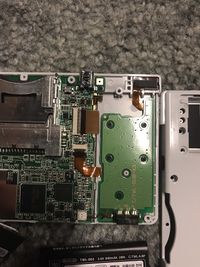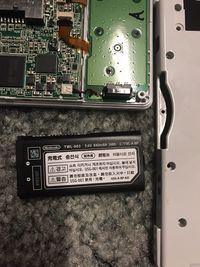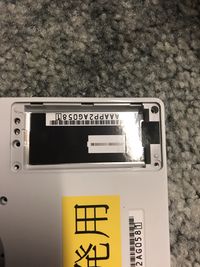Difference between revisions of "DSi Prototypes"
m (RedBees moved page Japanese DSi Development Kit to Japanese Nintendo DSi Prototype) |
|
(No difference)
| |
Revision as of 10:18, 30 May 2019
CPU-X4, formely known as the Japanese Nintendo DSi Prototype is a prototype that was used for development of Nintendo DS or DSi software. This unit is completely different from a retail unit.
Discovery
The prototype was first found on December 18th 2018 when a user by the name of Trash_Bandatcoot started a conversation with a user by the name of ProtonX on NintendoAge. Trash_Bandatcoot asked about any DSi development units he owns or may have owned. ProtonX replied that he had 2 Panda DSi's and at the moment a "weird looking DSi".
A day later, Trash_Bandatcoot released all the information he collected to GBAtemp.
General differences
- The DSi shell has a glossy finish, similar to the back of the top screen of a Nintendo DSi XL. Nintendo does this often on pre-production shells, but the overal look replicates a retail unit.
- The button prints are darker than the ones you can find on a white retail Nintendo DSi. They're black instead of grey.
- There are no prints for POWER, START, SELECT, or any of the icons for "on", "charging" or "wireless connections".
- There are no prints on the back, only a yellow sticker that says "Only for development" (as seen on the image above).
- The DSi boots to a different kind of menu, rather than a regular System Menu. All they used for this one were cartridges.
Unit settings
All of these settings can be found on a retail Nintendo DSi under System Settings.
- Language - Changes the language, despite there being only 1 language on the console.
- Set Time & Date - Allows you to change the time & date of the unit.
- Change User Data - Allows you to change user data with examples being name, birthday, personal message, ect.
- Calibrate Touchscreen - Allows you to calibrate the touch screen. However, it does not let you test it afterwards.
- Wireless Connections - Allows you to turn on or off wireless connections, like Nintendo WFC or Download Play.
Board revision
On December 18th 2018, ProtonX released photos from the inside, confirming this was a prototype.
- There is no sticker on the board. Instead, Nintendo used permanent marker with A-2 written on it.
- The board has CPU-X4 writen on it. A retail Nintendo DSi has CPU-01 writen on it. This is enough to confirm that this is a prototype, noted by Razor83:
Actually Ninty always uses X to denote prototype motherboard revisions, so X4 means its the fourth prototype revision. When the motherboard is finished and final/retail they change it to 01.
Trading
Somewhere around May 2019, the console was traded off for $750 to an unknown seller on NintendoAge. ProtonX replied that he did not want to reveal the name of the seller, “unless he wants to be revealed”. Ever since then, more people started to talk about this unit, meaning that the unit is now worth a lot more.
Notes
- The prototype did not come with a special cartridge or SD Card, said ProtonX.
- When you insert a cartridge into Slot-1, it will boot up regularly, without Health & Safety screen. However, it's unknown if this unit even has TWL-support at all.
- This is what ProtonX had to say when talking about a NAND dump:
Yeah, I'm unlikely to do a NAND dump, as I've never been part of the missing scene. However, I did collect lots of development equipment at one point (I've got Wii U kits, GBA, DS, 3DS) which is where I got this.
- The battery that came with the unit was dead, so it had to be replaced with a retail one.
